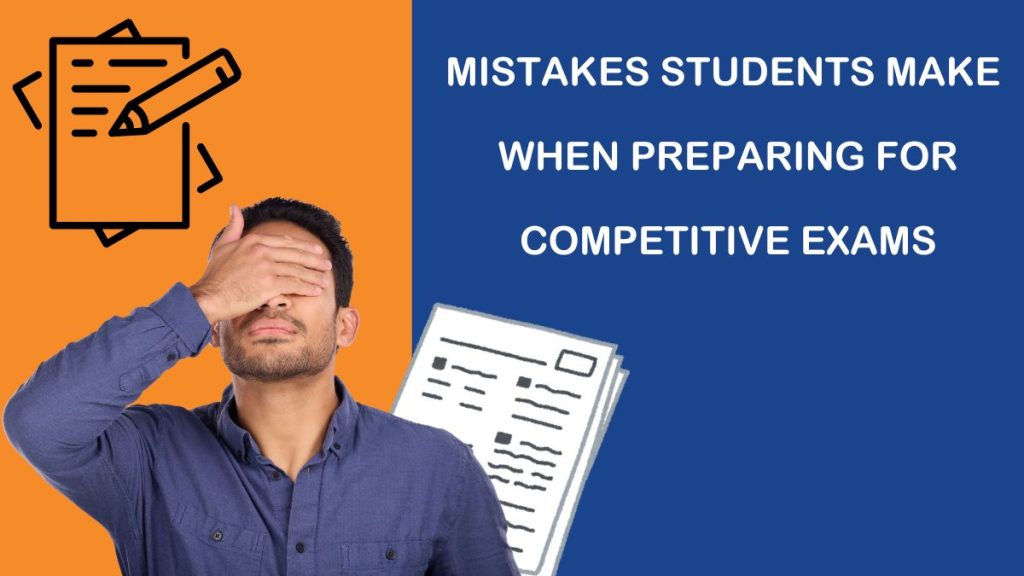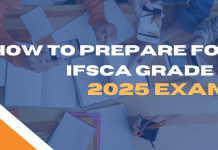Preparing for competitive exams is no laughing matter. The process is rigorous, the competition cutthroat, and the pressure can shatter even the most confident of candidates. Most students work for months—even years—on their preparation, but one little mistake can ruin it all. And the bad news? These mistakes are totally preventable.
Let’s break it down. Here are some common mistakes students make while preparing for exams like UPSC, SSC, Banking, and others. If you’re in the middle of your preparation, take note and avoid these errors.

1. Not Having a Proper Study Plan
Many students dive directly into preparation without a plan. They begin learning whatever they want on a particular day. But without a good strategy, it is simple to spend time on low-weightage topics and neglect high-weightage sections.
Solution? Plan a daily and weekly routine based on the exam syllabus. Group topics based on priority and difficulty level. And most importantly, adhere to it.
2. Reading More, Practicing Less
A lot of aspirants think that reading plenty of books and viewing countless online lectures is sufficient. It’s not. Competitive exams check your mettle at applying concepts while working under pressure. And that can only be done through practice.
Mock tests, previous year papers, and sectional quizzes—these must be a part of your regular routine. Not practicing sufficiently is one of the most common reasons why students fail in real exams.
3. Disregarding the Exam Pattern and Syllabus
Certain students start studying without even having knowledge of the precise syllabus and exam pattern. They waste time on subjects that may not even be applicable. This is a big mistake.
Always begin with a complete grasp of the official syllabus and exam pattern. Understand the weightage of various topics, the marking scheme, and whether there’s negative marking. Each exam is unique, and learning these facts can spare you undue effort.
4. Not Managing Time During the Exam
Time management is an ability most students neglect until the last minute. In the real exam, every second matters. Some of the candidates spend a lot of time on one difficult question and waste time, missing simple ones. Others hurry and make foolish errors.
The solution to this? Practice mock tests with stringent time constraints. Condition yourself to spot easy questions first, do them in a hurry, and then proceed to more challenging ones in a planned manner.
5. Over-Dependence on Too Many Study Materials
It is an attractive idea to purchase several books and take multiple online courses and believe that the more resources, the better the preparation. However, this ends up confusing one. Too many sources of information lead to inconsistency in learning.
Choose few but quality study materials and be consistent with them. Going through one book in depth is preferable to glancing over five.
6. Skipping Revision
Most students continue learning new stuff but don’t revise previously learned material. Therefore, they remember things at the wrong moment.
Revision is not negotiable. Allocate a minimum of one day a week for revision. Take short notes, flashcards, or summary sheets—whichever suits you. But ensure that you return to previous topics on a regular basis.
7. Not Taking Care of Health
This is usually neglected. Most students reduce sleep, consume junk food, and skip exercise, believing it will provide them with extra study time. Poor health, however, results in low energy, poor concentration, and burnout.
Regardless of how much you prepare, if your mind is not working because you are tired, all your efforts are in vain. Sleep well, eat well, and take breaks to clear your mind.
8. Not paying attention to Mock Tests and Analysis
Some students do mock tests for the sake of it without going through their errors. This is counterproductive.
After each test, take time to go over your weak spots. Look where you lost marks—was it because of ignorance, stupid errors, or poor time management? Working on these areas will make a significant difference on the last exam.
9. Not Having an Exam Strategy
Simply studying hard does not work. You require a good plan on the exam day—how much to attempt in questions, how to deal with difficult ones, how to aim for maximum precision, and how to leave out questions.
You may make rushed choices during the exam if you do not have a properly considered plan, something that will burn precious marks.
10. Allowing Stress to Dominate
Finally, anxiety and self-doubt can spoil everything. Most students get nervous near the exam, and their morale gets affected.
Competitive exams are as much a test of mental toughness as of knowledge. Be positive, have faith in your preparation, and do not let fear overcome you. Meditation, mild exercise, and a supportive group can assist in maintaining stress levels in control.
Final Thoughts
Cracking an exam is not all about how many hours you put in. It’s about studying smart, not falling for the most obvious mistakes, and improving your strategy through the months. If you’re sitting down for an exam, take a moment to think—are you guilty of one of these mistakes? Correct them immediately, and you’re already ahead of a massive percentage of the pack.
Now, go get that rank.
At ixamBee, we specialize in providing comprehensive online courses for government exams and online courses for government jobs. Our expertly designed courses for government jobs cater to a wide range of upcoming government exams. Whether you’re preparing for specific courses for government exams or seeking general guidance, ixamBee offers the resources like Beepedia previous year papers, SSC CGL, SSC CHSL, SSC MTS and other mock tests to succeed in exams like RBI Grade B, SEBI Grade A, NABARD Grade A, RRB NTPC, SSC MTS, NIACL Assistant, and more.














